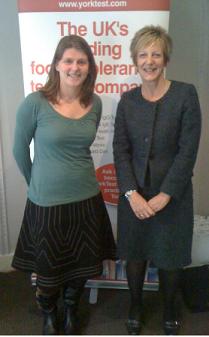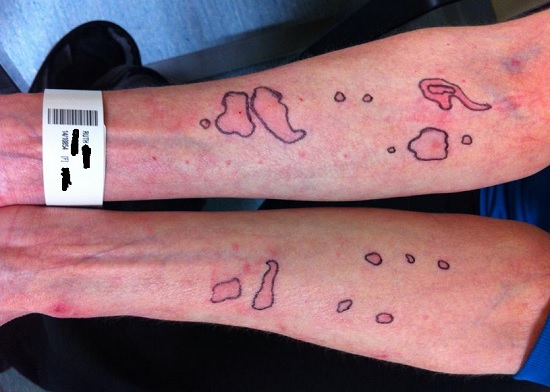My understanding has always been that food intolerance tests are not entirely scientific. I’ve been told this by lots of different people, including my own doctor, who told me that you can’t test for food intolerances. Recently I’ve had allergy blood tests done which helped diagnose the foods I knew I was allergic to; food allergy tests look for IgE reactions in the blood which cause an automatic immune response. The body thinks there is danger to fight, when in fact it’s just some innocent food; instead of ignoring the food it fights it as if it were bacteria or a harmful germ, the result is a nasty allergic reaction.
Allergies are where a person reacts to varying degrees whenever they eat even small traces of a certain food. Symptoms can range from skin reactions, problems breathing, nausea and vomiting to anaphylaxis and in rare cases, death.
Food intolerance on the other hand is a far milder reaction and not life threatening. They are caused by IgG reactions in the blood to proteins in certain foods. People can react to foods sometimes, but be able to tolerate them in small doses or in moderation. This is very different to a real allergy and is what leads to so much confusion between the two conditions. Some people with a food intolerance will describe it as an allergy, and when people see them eating that chocolate pudding they’ll question whether they are making a fuss unnecessarily. Understandably so, but this makes it doubly hard to be taken seriously in restaurants and in life as some view people with allergies are just fussy eaters!
This brings me on to the main reason for this blog post. I attended an event last week organised by YorkTest Laboratories called “Understanding food intolerances: fact from fiction”. The pull of meeting two eminent doctors got me interested and I decided to attend. I met Dr Hilary Jones and Dr Gill Hart and the event totally changed my views of food intolerance testing.
Dr Hilary Jones endorses YorkTest
Dr Hilary Jones is most famous for appearing on TVAM and then GMTV, where he is a regular on the early morning slot. He has written several books including ‘Before You Call The Doctor, ‘What’s The Alternative?’, ‘Your Child’s Health’, ‘I’m Too Busy To Be Stressed’, ‘Total Well Being’ and ‘Natures Remedies’. His first novel, ‘What’s Up Doc?’ was published in August 2009. He can also be heard on the Steve Wright Show on Radio 2 and also writes for various magazines including Rosemary Conley magazine and News of the World. Dr Hilary Jones is also the new health editor of breakfast television.
I was very privileged, excited and just a little star struck to have the chance to chat about food intolerance with him. I wanted to know why he was interested in food intolerance testing and in particular those conducted by YorkTest Laboratories. He told me that he sees more and more patients at his practise with food intolerances. Historically the NHS hasn’t viewed this problem seriously since it’s not life threatening, but it can seriously effect the quality of people’s lives. To feel constantly unwell, tired, depressed etc. is not a fulfilling life and can hinder work performance, relationships, sleep patterns and general enjoyment of life.
He told me that he started to research various food intolerance tests and has also been to visit YorkTest Laboratories to see for himself how they carry out their tests. He is now a strong advocate of the tests and told me he thinks they are scientific and proven.
You can visit YorkTest Laboratories website to watch a video of Dr Hilary Jones discussing the benefits of taking the YorkTest
Dr Gill Hart, Scientific Director at YorkTest Laboratories
I met Dr Gill Hart, Scientific Director at YorkTest Laboratories who explained the results of my YorkTest. They showed that I have a mild intolerance to gluten, wheat, yeast and egg white. This is exactly what I would have expected to see, since I know I have to watch the amount of gluten and egg I eat. If I keep it to a minimum I can tolerate both, however, if I overdo it and eat too much egg, bread or yeasty things I do suffer with minor skin rashes and stomach pain. This can cause eczema and asthma flare ups, cause me to become very easily run down and bring on the cold sores!
Elimination diets and food diaries
It’s taken me years to discover what foods trigger a problem with me, and conducting a strict elimination diet was one of the most helpful things I did. However this is really tough to stick to in practise and very hard to control. Elimination diets are incredibly restricting, and it can be hard to pinpoint exactly which foods are causing a problem, since some people can be intolerant to even the key foods you are told to begin limiting your diet to during a food elimination experiment.
Dr Gill Hart feels these tests are a quick and easy solution for so many people and YorkTest have seen some amazing results and success stories. As well as your test results you also get two free sessions with a nutritionist to ensure you understand the results and how to stay healthy and keep to a balanced diet, even when avoiding certain foods.
This is what Gill says about YorkTest, “YorkTest is a pioneering organisation with a strong scientific base. As Scientific Director I ensure that each of the services we offer is fully validated and adheres to the highest scientific standards. I also ensure that we meet all the required quality and regulatory requirements, so you can have every confidence in the results you receive.”
I was also thrilled to find out that Gill contributes to the Talk Health Partnership blog, which I’ve also just started blogging on. Read more here: Dr Gill Hart, industry expert on Talk Health Partnership
What is the YorkTest?
It’s important to understand that the YorkTest does NOT test for allergies. They only test for intolerances which look for IgG anti-body reactions in the blood to 113 foods. So the YorkTest wouldn’t identify any real allergies, and if you had already cut out a certain food, suspecting a problem, it wouldn’t identify that either. For the test to work, the person must be eating the problem the problem food as normal before the tests, this ensures the blood contains anti-bodies and means results will flag any problem foods.
I can’t think of a better explanation of what food intolerance is than the one I read recently on the Talk Health Partnership blog, written by, none other than, Dr Gill Hart.
“10 myths of food intolerance”.
Allergy UK also endorse YorkTest.
Attending this event and speaking to these two renowned experts, both extolling the virtues of YorkTest, has really changed my views about food intolerance testing. Before attending I had been very sceptical, mainly because most people I spoke to believe them to be unscientific. I now believe that if done properly under laboratory conditions, as at YorkTest Laboratories, these tests can offer very useful insights into how a persons blood is reacting to certain foods.
If you’ve ever tried to get a referral to an allergy specialist and allergy testing you’ll know how difficult that can be. It can take months just to get the first appointment since there are very few allergy specialists practising, despite the steadily rising numbers of people with allergies and food intolerances. The tests done by the NHS will only identify real allergies, not intolerances. So if you have food intolerances you’ve just hit a brick wall. There is no alternative but to go private and I know from experience that you’ll consider trying anything to find some answers and relief from unending, depressing and painful symptoms.
So how do you decide which tests to try? There are so many options out there and they can cost quite a bit of money, and potentially provide you with misleading results. What’s worrying is that disreputable tests could mean people cut foods completely out of their diets unnecessarily which can lead to an unbalanced and unhealthy diet. Without understanding the nutritional implications cutting foods out can be very bad for your health. Make sure you get the right advice. YorkTesk provide free follow up sessions with a nutritionist so you can find out how to cut the foods out, how long for, and how to replace vitamins, protein etc. to give you a balanced diet. Ultimately with time you should be able to tolerate the foods you are intolerant to, and sometimes the body learns to tolerate them again in the future so it’s so important to react sensibly and get professional advice.
Have you tried the YorkTest or any other food intolerance tests? What did you think about the results?














Hello Ruth,
Been a while since I ‘spoke my mind’…
Sorry about this, but I can’t help finding this post very uncritical and one-sided. You seem to have unquestioningly taken on board the word of two individuals who are paid by YorkTest – what else are they going to say but that it is scientifically proven?
Besides, that the test is ‘scientific’ or ‘unscientific’ is not the issue. The tests measure IgG levels in the blood – and there’s no reason to doubt they do so accurately.
What *is* the issue is whether raised IgG levels indicate food intolerance, in the same way that raised IgE levels may indicate food allergy.
There’s no evidence to suggest this is true.
Even Allergy UK admit that the evidence is “not clear”. NICE singled out the IgG test earlier this year as one that should be avoided. I blogged about all this (and you commented). See: http://foodallergyandintolerance.blogspot.com/2011/02/nice-allergy-uk-food-allergies-and.html
The issue has even made Parliament. Interesting remarks: http://www.publications.parliament.uk/pa/ld200607/ldselect/ldsctech/166/16611.htm
Bet Dr Hart didn’t tell you about all that?
I’ll have to remain a sceptic on this one until they can demonstrate some evidence which the scientific community considers worthwhile.
All the best, Alex.
Alex, Alex, Alex… I do so love your comments on my blog. Firstly, in my defence, my blog is where I share my views, my feelings, my discoveries, blah blah blah, so occasionally there may be one sided views. This was how I felt after going to the YorkTest event, for which I was decidedly scepital before attending. The professionals there were very very persuasive and I kind of thought that things must have moved on, and that perhaps the validity of these tests has risen in medical circles. You’re right to point out that I had blindly believed them, but they were very believable and plausible.
However, after a long and fascinating day at the Anaphylaxis Conference in London yesterday (great timing, wish I’d been to this before the YorkTest event) I had the chance to put this question to many of the professional dieticians, nurses and doctors present who were mostly very much of the same opinion as you and supported the caution advised by the NICE guidelines. Some were horrified and dismayed that a prominent doctor such as Dr Hilary Jones should put his name behind such a company.
However there was a healthy debate after one of the talks as The Anaphylaxis Campaign itself has corporate members from private test companies like YorkTest. There was indeed a representative attending from a testing company who I didn’t get the chance to speak to. The general discussion was that these test results ARE NOT scientific; they may be conducted under proper laboratory conditions, and are most definitely testing for the presence of IgG anti-bodies to certain food proteins, but that this in itself doesn’t mean that the person being tested has food intolerances to all or any of the foods which are identified. The scale they use from 1 to 4 was also questioned. How do you qualify how severe an IgG reaction might be from a blood test? But most importantly from another session, we heard that approximately a third of patients that were seen from one particular study had tried alternative treatments of some kind to find a diagnosis. Half of these had come to an incorrect diagnosis and only a third of them had sought advice on exclusion diets, reintroduction and food challenges.
The problem here is that the NHS is sadly failing a huge majority of people with both IgE mediated and non IgE mediated allergies, the latter being much harder to diagnose due to the delayed and chronic sypmtoms, as opposed to quick and life threatening reactions in IgE mediated allergies. If you have a food intolerance you are even further down the queue.
So many people don’t get the advice, referral or help they so desperately need for themselves of their child, and until you’ve lived with unending pain, discomfort and torment of constant unidentified symptoms you won’t understand what drives someone to desparate measures. It’s a shame that for some, when you’ve hit the brick wall, these food intolerance tests can be very appealing because they promise some light at the end of the tunnel. Whether they provide that is another question. The results that came up for the YorkTest they did for me last week were correct. I know what my food intolerances are due to a controlled exclusion diet, which incidentally I researched and did myself off my own back, not through the NHS and I couldn’t afford to go private. I made sure I knew what vitamins and minerals my body needed and which foods I could eat to ensure I had a balanced diet.
The problem is that false positives are very common from these tests and not everyone would go to these lengths of getting the right advice. I’m very lucky to have some very close friends who are dieticians who have been invaluable in helping me. The NHS has not been so helpful. They just don’t have the time to help someone through a lengthy and complex exclusion diet and reintroduction. It’s not for the faint hearted.
The biggest danger in these tests is that because they can bring up false positives it can mean that people unecessarily constrict their diets which can be very detrimental to their health. I know, I know this is bad, and I know these tests are not cheap, but when you’re at the end of your tether you will try anything. What is the answer?
Alex, out of interest, do you have any allergies or food intolerances?
Hi Ruth,
And I love your very polite responses to my stroppy ones!
Yep, I get that it’s a place to share your opinion, but when you say something like “food intolerance… is … caused by IgG reactions in the blood…” you’re presenting it as fact, not opinion…
I do take your points re: the NHS and the desperation of people. I know some people do find IgG testing helpful and feel better for it. I can’t deny that. But this does not prove the test is a valid measure of food intolerance. There could be lots of reasons for health improvement (healthier diet, ‘a change is as good as a rest’ – I’ve blogged about it before). If I were to read my stars today and they proved to be accurate it would not prove astrology. Same thing applies here. But it’s easy to be convinced by YorkTest’s slick marketing literature: when I wrote my Food Intolerance book I was, and was fairly positive about it, at a time when it seemed to be looking promising. I’ve become a bit more critical and analytical since then, though!
No, I don’t have allergies or intolerances. I think this is an advantage, because it allows me to stay impartial and not have my experiences colour my perception of the issues. I know that it is very difficult when you have a lot of personal experience in a subject to remove yourself from considerations entirely. You are almost bound to apply your own views and experiences to draw wider conclusions to other people, but this isn’t reliable. I will blog about this another day!
Alex.
Alex I’m just pleased you’ve read it, even if it made you want to scream, shake my by the shoulders and tell me do my research. HAHA. At least ONE person reads my blog! Consider my wrists slapped and I promise not to be so emotional and rush into a blog post in future without due care and attention. You have no idea how much I wish I’d kept that one in draft for a while.
Another thing that interests me here is the placebo effect. Why does this work? Do the very plausible marketing claims on a website and the obvious craving for a solution affect any potential outcome of any tests, change in diet or exclusion diet? We so want something to work, so it does. Very interesting. Did you watch The Food Hospital this evening? It was on Channel 4 at 8pm. Next week it’s covering food intolerances. Check it out and send in your questions.
Am sure will always read your blog, Ruth! Didn’t mean to come across as wanting to slap your wrists – it’s the discussion that follows that’s of value. Maybe the YorkTest team will come along and comment too, at some stage. Be great if they did. I’m all for more debate – and maybe there was some new stuff presented at the media day that I’d not seen…
I don’t know much about the placebo effect, but it can be considerable. And yes, it can be a problem in the subject of allergies and intolerances, especially in regards to self-diagnosis. A person strongly suspicious of wheat being a problem may cut it out – and the placebo effects then kicks in and they feel better. They’re convinced it’s the wheat, they self-diagnose wheat intolerance – but it’s not a safe diagnosis. Happens a lot. Of course sometimes it’ll be a genuine intolerance, sometimes a dietary problem, sometimes something else, sometimes a combination of factors, including placebo – but it’s something an individual can’t measure him or herself…
Did hear that the Food Hospital was doing sensitivities next week. I’m sure it’ll spark lots of debate!
A.
And the big problem is that if you actually sit down and write down a detailed food diary you’d be amazed at the amount of different things you eat. Any one of them could be causing the problem. Or none of them! Sometimes I get reactions purely down to stress. My eczema can flare up almost immediately sometimes. I find myself scratching if I’m under a lot of pressure or in a very difficult situation, I get hot and itchy and if I’d just eaten a bread roll I might possibly blame that bread roll on the resulting carnage I’ve left behind by my scratching. The bread roll isn’t the problem at all but I can blame it and that makes me feel better.
I know food intolerances cause eczema for me, but also, I know that they aren’t always the cause. And to further complicate things, other circumstances can effect whether you might react to a certain food. Again, being stressed can heighten the chances of an intolerant reaction to a food. But the following week, when not stressed, you can eat it fine. The body is just way too complicated. We just have to be kind to it and listen when it screams and isn’t happy.
I did hear about the Food Hospital and will be watching. I’m fascinated by that progamme. Amazing what the western diet has to answer for and how food could avoid an operation?
It was fascinating to read your comments on IgG testing Alex. It’s great that our event has sparked this debate about a method that is used worldwide as a starting point for those embarking on an elimination diet to try and ease their food intolerance symptoms. I hope you don’t mind but I have asked our PR company for your contact details so that I can contact you and discuss the issues you have raised in person.
Hey Gill, thanks for commenting. Would love to read your response to Alex on here so everyone can see what you say.
Hi Dr Hart,
Thanks – glad you found the comments interesting.
You can contact me easily through my blog or website.
All the best, Alex.
Two things from someone who works with lots of clients presenting with atopic diseases such as eczema, asthma, digestive problems such as bloating, constipation/diarrhoea and nausea, fatigue, aching joints and IBS. Firstly I agree with Ruth that there are other kinds of food reaction that are not IgE mediated. The test that I use in clinic is by Genova Diagnostics and is called a Food Allergen Cellular Profile. It measure both IgE and nonIgE mediated reactions. Do check it out.
Secondly it is my job to not only understand what foods people are reacting to but why? There are multiple underlying causes. Rarely do either food allergies or reactions to foods exist in isolation. I often find a link between reduced levels of probiotics, an overgrowth of a potentially pathogenic bacteria or even the existence of a parasite that shouldn’t be there. Where non-IgE reactions are concerned I believe there is scope for improvement which is why I do what I do with these clients.
Thanks Alex Gazzola for this link http://www.sciencebasedmedicine.org/index.php/igg-food-intolerance-tests-what-does-the-science-say/